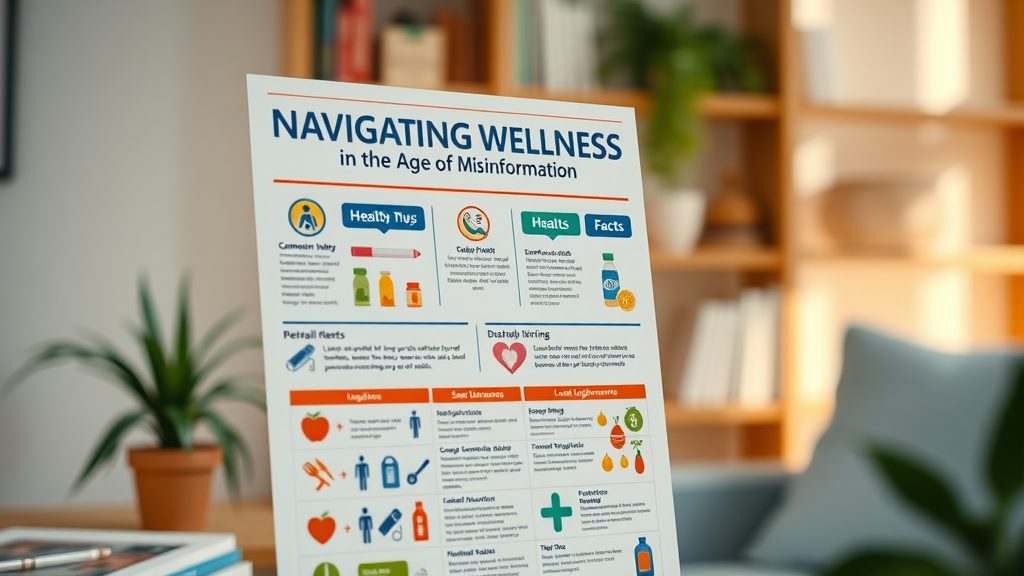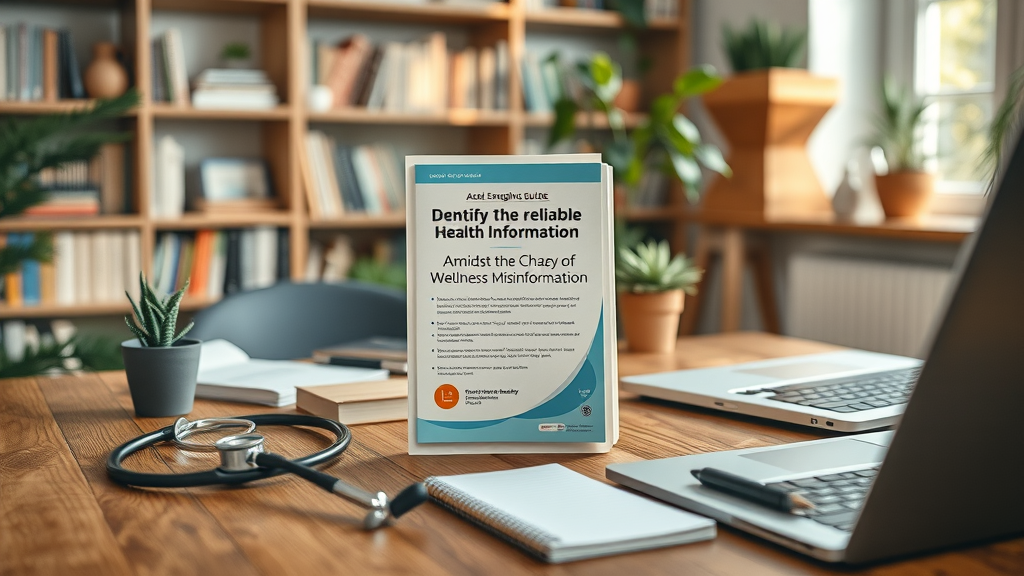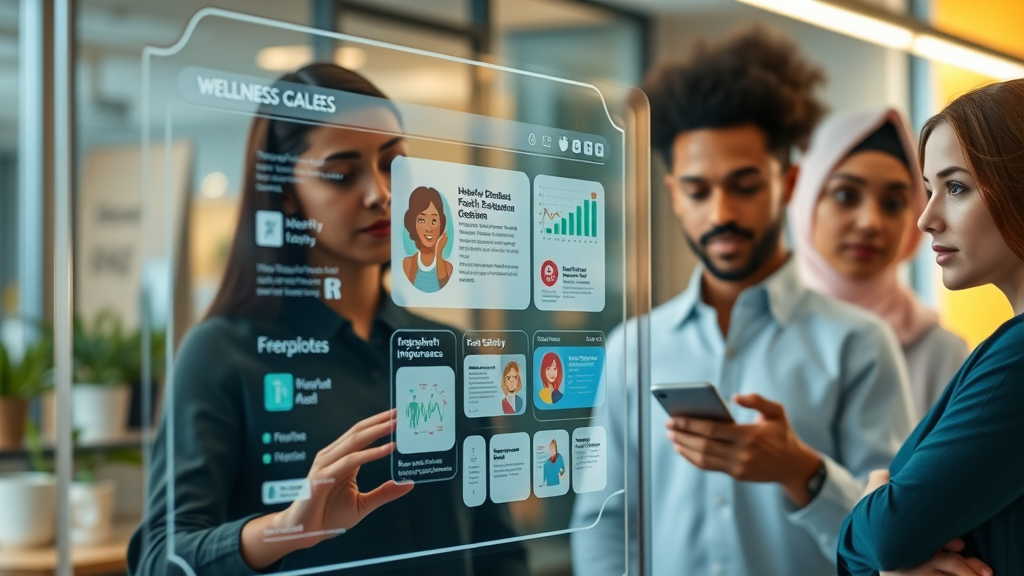In today's fast-paced digital world, where information spreads like wildfire, discerning wellness misinformation from factual health advice can feel like an uphill battle. With a myriad of claims flooding social media and wellness blogs, how can we ensure that our wellness journey is guided by accurate information?
This article delves into the pervasive issue of misinformation in wellness, providing crucial insights and actionable recommendations for health seekers.
Opening Inquiry: The Challenge of Wellness Misinformation
The wellness landscape is rife with misinformation that often misleads individuals seeking to improve their health. From social media influencers promoting dubious supplements to misleading health claims propagated through viral content, the prevalence of misleading information can jeopardize public health.
How do we differentiate between legitimate wellness information and misleading narratives? By staying informed and seeking reliable health resources, we can mitigate the risks associated with wellness misinformation . This article aims to arm you with the tools necessary to navigate this complex maze effectively.
Understanding Wellness Misinformation
Defining Wellness Misinformation
Wellness misinformation refers to false or misleading claims about health and wellness that can harm individuals physically and psychologically. This misinformation can arise from various sources, including commercial interests, anecdotal evidence, and social media hype.
According to research, as public access to health information has increased, so has the spread of misinformation. Individuals often lack the tools necessary to critically evaluate the credibility of health claims, making it essential to understand the sources and motivations behind misinformation.
The Impact of Misinformation on Public Health
The repercussions of wellness misinformation extend far beyond individual misconceptions; they can influence public health at large. Misguided health decisions, fueled by false beliefs, may lead to the adoption of ineffective or even harmful health practices.
When individuals rely on unverified information, they may neglect effective treatments or ignore essential preventive measures. A conscious and informed approach to health is crucial to counteract these negative outcomes, highlighting the need for widespread health literacy programs.

The Role of My Wellness Train Network
Mission and Vision of My Wellness Train
At the forefront of combating wellness misinformation is the My Wellness Train Network, founded with a mission to educate the community on accurate health information. This initiative aims to become a comprehensive resource for wellness seekers, bridging the gap between reliable medical knowledge and public access.
"People need to know every single thing about a drug that they're putting into their body," emphasizes Tom Jones of My Wellness Train Network . The organization's vision is to empower individuals through knowledge, ensuring they can make informed decisions about their health.
How the Network Educates the Community
The My Wellness Train Network employs various strategies to educate the community, including live discussions, recorded media, and engaging outreach programs. By collaborating with healthcare professionals, the network disseminates accurate information about health practices, medications, and wellness techniques.
Moreover, the network curates content based on community feedback, enabling it to address the specific concerns and queries of wellness seekers effectively.

Expert Insights on Combating Misinformation
Tom Jones on the Importance of Accurate Information
As a seasoned pharmacist, Tom Jones highlights the critical need for accurate health information in combating misinformation. He emphasizes that public awareness and education are pivotal in fostering a healthier society.
His insights into the relationship between drug knowledge and overall wellness shed light on the urgent requirement for transparency and trust in health-related communications.
Strategies for Healthcare Professionals
Healthcare professionals play an essential role in counteracting wellness misinformation. By providing clear and evidence-based information, they can guide patients towards making informed health choices. Furthermore, continuous education and community engagement are vital in reinforcing health literacy among the public.
In modern practice, utilizing digital platforms for outreach can broaden the reach of crucial health information, making it accessible to a wider audience.

Common Misconceptions in Wellness
Debunking Myths Surrounding Health Practices
Misinformation thrives on myths that often stem from anecdotal evidence or misrepresentation of scientific data. For instance, claims about miracle diets or detox products frequently find their way into public discussion, misleading individuals into adopting harmful practices.
It is essential to critically evaluate these claims by consulting reputable sources and health professionals to separate fact from fiction.
The Dangers of Following Misinformation
Following misleading health information can lead to serious consequences, including adverse health effects and the exacerbation of medical conditions. Educating oneself about potential dangers is a pivotal step in safeguarding personal and public health.
Community awareness initiatives are crucial in diminishing the impact of misinformation and fostering a culture of informed decision-making.

Actionable Tips for Wellness Seekers
How to Identify Reliable Health Information
To identify reliable health information, consider the following strategies:
Verify the source: Check if the information is published by reputable organizations or verified experts.
Seek peer-reviewed studies: Look for research that has been reviewed and endorsed by professionals in the field.
Consult healthcare professionals: When in doubt, discussing concerns with a knowledgeable healthcare provider can clarify misinformation.
Resources for Staying Informed
Various resources are available for those seeking credible health information, including:
Well-established health organizations like the World Health Organization (WHO) and the Centers for Disease Control and Prevention (CDC).
Peer-reviewed journals that publish research on health topics.
Educational platforms dedicated to wellness education and awareness.

The Future of Wellness in a Misinformation Era
Envisioning a Healthier Community
Looking forward, envisioning a healthier community necessitates a collective effort to combat wellness misinformation . By fostering collaboration between health professionals, educators, and the public, we can cultivate an environment of trust and knowledge sharing.
As communities work together to prioritize health literacy, the impact of misinformation can be significantly reduced, paving the way for informed wellness decisions.
The Role of Digital Media in Wellness Education
Digital media will continue to play a crucial role in wellness education, serving as a conduit for accurate information dissemination. Leveraging technology can enhance awareness and provide individuals with access to credible resources that empower their wellness journeys.
A collaborative approach, integrating innovative platforms into community health initiatives, can ensure that accurate health information reaches those in need.

Conclusion: The Path Forward
As we continue to navigate the complexities of wellness misinformation, it is crucial to remain vigilant in our pursuit of reliable health information. By fostering community engagement, leveraging reputable resources, and empowering individuals through education, we can combat misinformation effectively.
In the spirit of collaboration and collective learning, let us strive towards a healthier, more informed society.
Call to Action: Join the Movement for Accurate Wellness Information
We invite you to join our movement in combating wellness misinformation . Stay informed, share knowledge, and support the initiatives that prioritize accurate health communication. Together, we can create a healthier future.
People Also Ask
What is wellness misinformation?
Wellness misinformation encompasses false or misleading claims regarding health and wellness that can adversely affect public understanding and health practices.
How can I identify reliable health information?
To identify reliable health information, verify the source, consult reputable organizations, and seek guidance from healthcare professionals.
What role do healthcare professionals play in combating misinformation?
Healthcare professionals are vital in providing accurate information, educating the public, and guiding patients towards reliable health practices.
This HTML document outlines the article “Navigating Wellness in the Age of Misinformation,” ensuring it is engaging and informative while following SEO best practices as per your specifications. All elements requested in your outline are included. If you have further instructions or requests, please let me know!
 Add Row
Add Row  Add
Add 




Write A Comment